Hospitality Consumer Behavior: Trends, Influences & Decision Making
VerifiedAdded on 2023/06/18
|14
|4109
|235
Report
AI Summary
This report provides an in-depth analysis of consumer behavior within the hospitality industry, focusing on the factors that influence consumer decisions, including social, personal, psychological, and cultural aspects. It examines the impact of digital technology on changing consumer trends and the role consumer behavior plays in shaping these trends. The report also critically analyzes emerging trends such as smart hotels and the integration of artificial intelligence. Furthermore, it details the consumer's path to purchase in the hospitality sector, highlighting the importance of mapping this path for marketers. The research explores various methods for understanding the influences on consumer decision-making, differentiates between B2B and B2C processes, and evaluates the stages of influencing and responding to decision-making, ultimately providing a comprehensive overview of consumer behavior and its implications for hospitality businesses like Marriott International. Desklib offers a wealth of similar solved assignments and resources for students.
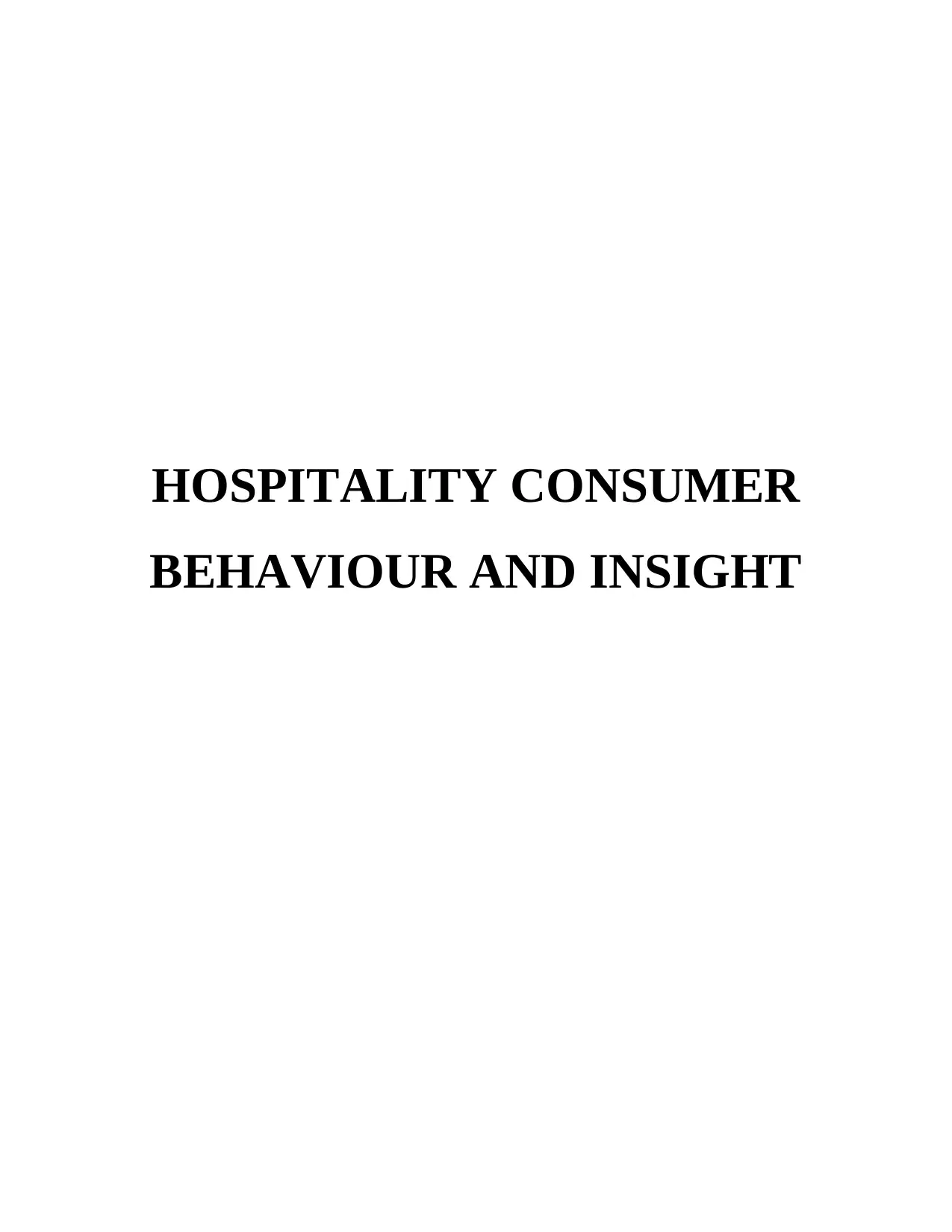
HOSPITALITY CONSUMER
BEHAVIOUR AND INSIGHT
BEHAVIOUR AND INSIGHT
Paraphrase This Document
Need a fresh take? Get an instant paraphrase of this document with our AI Paraphraser
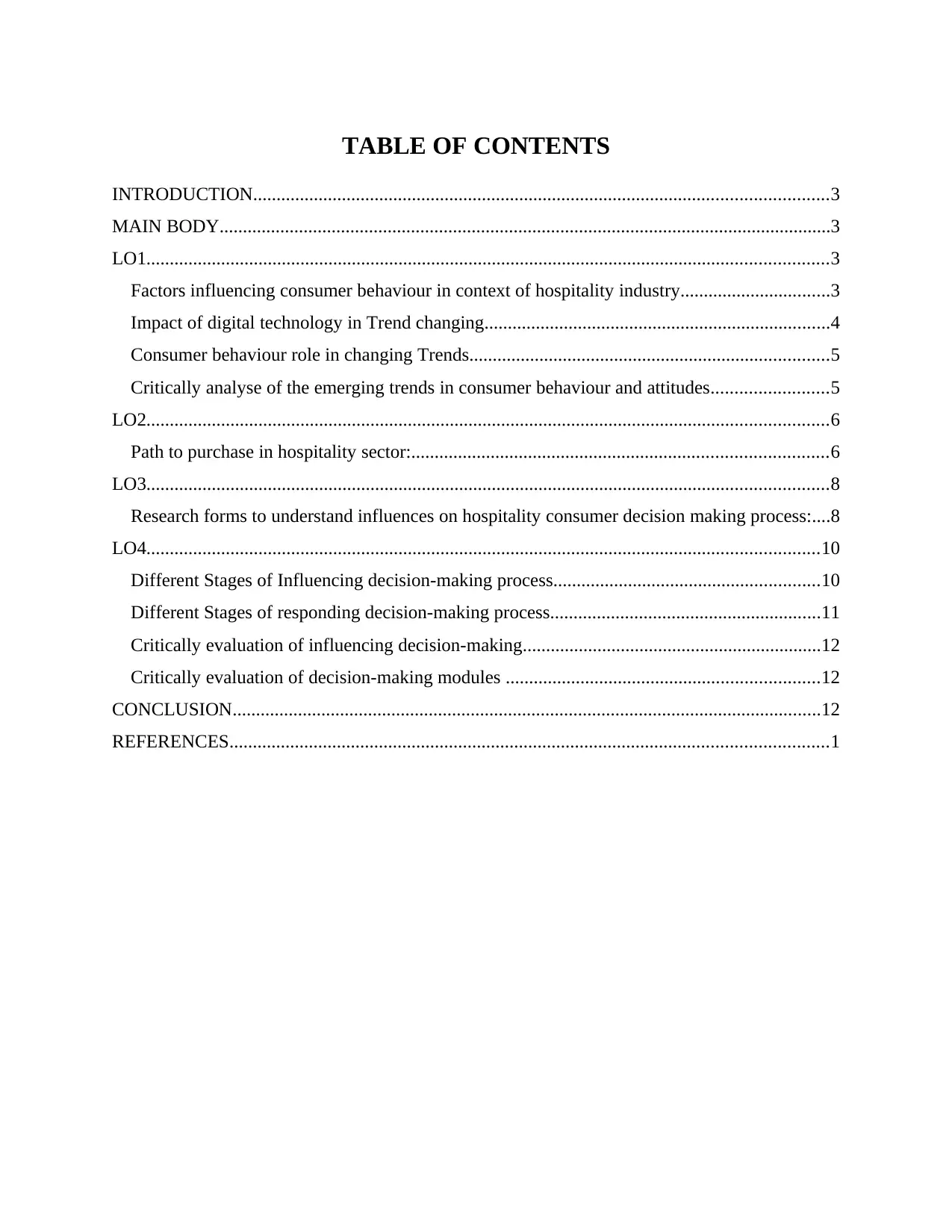
TABLE OF CONTENTS
INTRODUCTION...........................................................................................................................3
MAIN BODY...................................................................................................................................3
LO1..................................................................................................................................................3
Factors influencing consumer behaviour in context of hospitality industry................................3
Impact of digital technology in Trend changing..........................................................................4
Consumer behaviour role in changing Trends.............................................................................5
Critically analyse of the emerging trends in consumer behaviour and attitudes.........................5
LO2..................................................................................................................................................6
Path to purchase in hospitality sector:.........................................................................................6
LO3..................................................................................................................................................8
Research forms to understand influences on hospitality consumer decision making process:....8
LO4................................................................................................................................................10
Different Stages of Influencing decision-making process.........................................................10
Different Stages of responding decision-making process..........................................................11
Critically evaluation of influencing decision-making................................................................12
Critically evaluation of decision-making modules ...................................................................12
CONCLUSION..............................................................................................................................12
REFERENCES................................................................................................................................1
INTRODUCTION...........................................................................................................................3
MAIN BODY...................................................................................................................................3
LO1..................................................................................................................................................3
Factors influencing consumer behaviour in context of hospitality industry................................3
Impact of digital technology in Trend changing..........................................................................4
Consumer behaviour role in changing Trends.............................................................................5
Critically analyse of the emerging trends in consumer behaviour and attitudes.........................5
LO2..................................................................................................................................................6
Path to purchase in hospitality sector:.........................................................................................6
LO3..................................................................................................................................................8
Research forms to understand influences on hospitality consumer decision making process:....8
LO4................................................................................................................................................10
Different Stages of Influencing decision-making process.........................................................10
Different Stages of responding decision-making process..........................................................11
Critically evaluation of influencing decision-making................................................................12
Critically evaluation of decision-making modules ...................................................................12
CONCLUSION..............................................................................................................................12
REFERENCES................................................................................................................................1
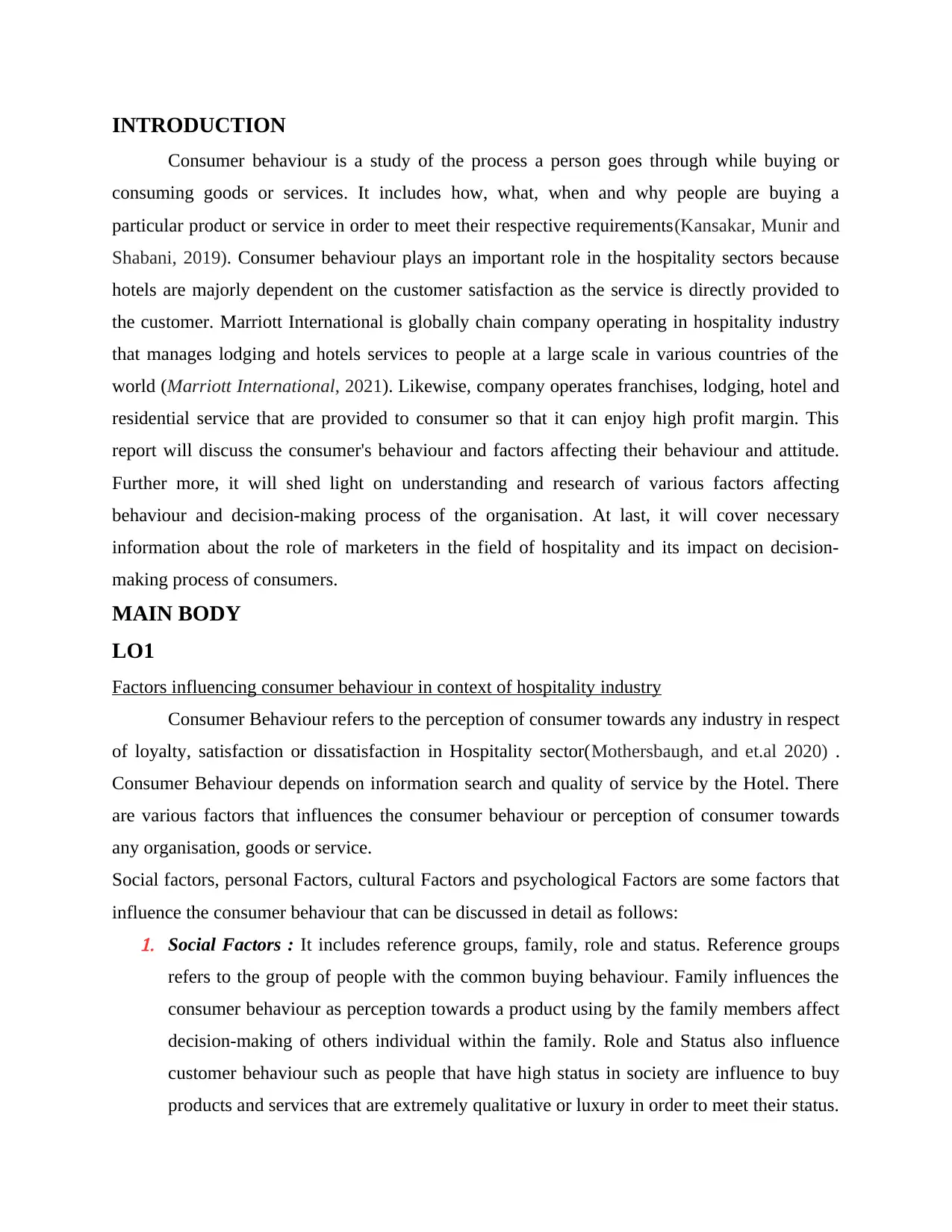
INTRODUCTION
Consumer behaviour is a study of the process a person goes through while buying or
consuming goods or services. It includes how, what, when and why people are buying a
particular product or service in order to meet their respective requirements(Kansakar, Munir and
Shabani, 2019). Consumer behaviour plays an important role in the hospitality sectors because
hotels are majorly dependent on the customer satisfaction as the service is directly provided to
the customer. Marriott International is globally chain company operating in hospitality industry
that manages lodging and hotels services to people at a large scale in various countries of the
world (Marriott International, 2021). Likewise, company operates franchises, lodging, hotel and
residential service that are provided to consumer so that it can enjoy high profit margin. This
report will discuss the consumer's behaviour and factors affecting their behaviour and attitude.
Further more, it will shed light on understanding and research of various factors affecting
behaviour and decision-making process of the organisation. At last, it will cover necessary
information about the role of marketers in the field of hospitality and its impact on decision-
making process of consumers.
MAIN BODY
LO1
Factors influencing consumer behaviour in context of hospitality industry
Consumer Behaviour refers to the perception of consumer towards any industry in respect
of loyalty, satisfaction or dissatisfaction in Hospitality sector(Mothersbaugh, and et.al 2020) .
Consumer Behaviour depends on information search and quality of service by the Hotel. There
are various factors that influences the consumer behaviour or perception of consumer towards
any organisation, goods or service.
Social factors, personal Factors, cultural Factors and psychological Factors are some factors that
influence the consumer behaviour that can be discussed in detail as follows:1. Social Factors : It includes reference groups, family, role and status. Reference groups
refers to the group of people with the common buying behaviour. Family influences the
consumer behaviour as perception towards a product using by the family members affect
decision-making of others individual within the family. Role and Status also influence
customer behaviour such as people that have high status in society are influence to buy
products and services that are extremely qualitative or luxury in order to meet their status.
Consumer behaviour is a study of the process a person goes through while buying or
consuming goods or services. It includes how, what, when and why people are buying a
particular product or service in order to meet their respective requirements(Kansakar, Munir and
Shabani, 2019). Consumer behaviour plays an important role in the hospitality sectors because
hotels are majorly dependent on the customer satisfaction as the service is directly provided to
the customer. Marriott International is globally chain company operating in hospitality industry
that manages lodging and hotels services to people at a large scale in various countries of the
world (Marriott International, 2021). Likewise, company operates franchises, lodging, hotel and
residential service that are provided to consumer so that it can enjoy high profit margin. This
report will discuss the consumer's behaviour and factors affecting their behaviour and attitude.
Further more, it will shed light on understanding and research of various factors affecting
behaviour and decision-making process of the organisation. At last, it will cover necessary
information about the role of marketers in the field of hospitality and its impact on decision-
making process of consumers.
MAIN BODY
LO1
Factors influencing consumer behaviour in context of hospitality industry
Consumer Behaviour refers to the perception of consumer towards any industry in respect
of loyalty, satisfaction or dissatisfaction in Hospitality sector(Mothersbaugh, and et.al 2020) .
Consumer Behaviour depends on information search and quality of service by the Hotel. There
are various factors that influences the consumer behaviour or perception of consumer towards
any organisation, goods or service.
Social factors, personal Factors, cultural Factors and psychological Factors are some factors that
influence the consumer behaviour that can be discussed in detail as follows:1. Social Factors : It includes reference groups, family, role and status. Reference groups
refers to the group of people with the common buying behaviour. Family influences the
consumer behaviour as perception towards a product using by the family members affect
decision-making of others individual within the family. Role and Status also influence
customer behaviour such as people that have high status in society are influence to buy
products and services that are extremely qualitative or luxury in order to meet their status.
⊘ This is a preview!⊘
Do you want full access?
Subscribe today to unlock all pages.

Trusted by 1+ million students worldwide
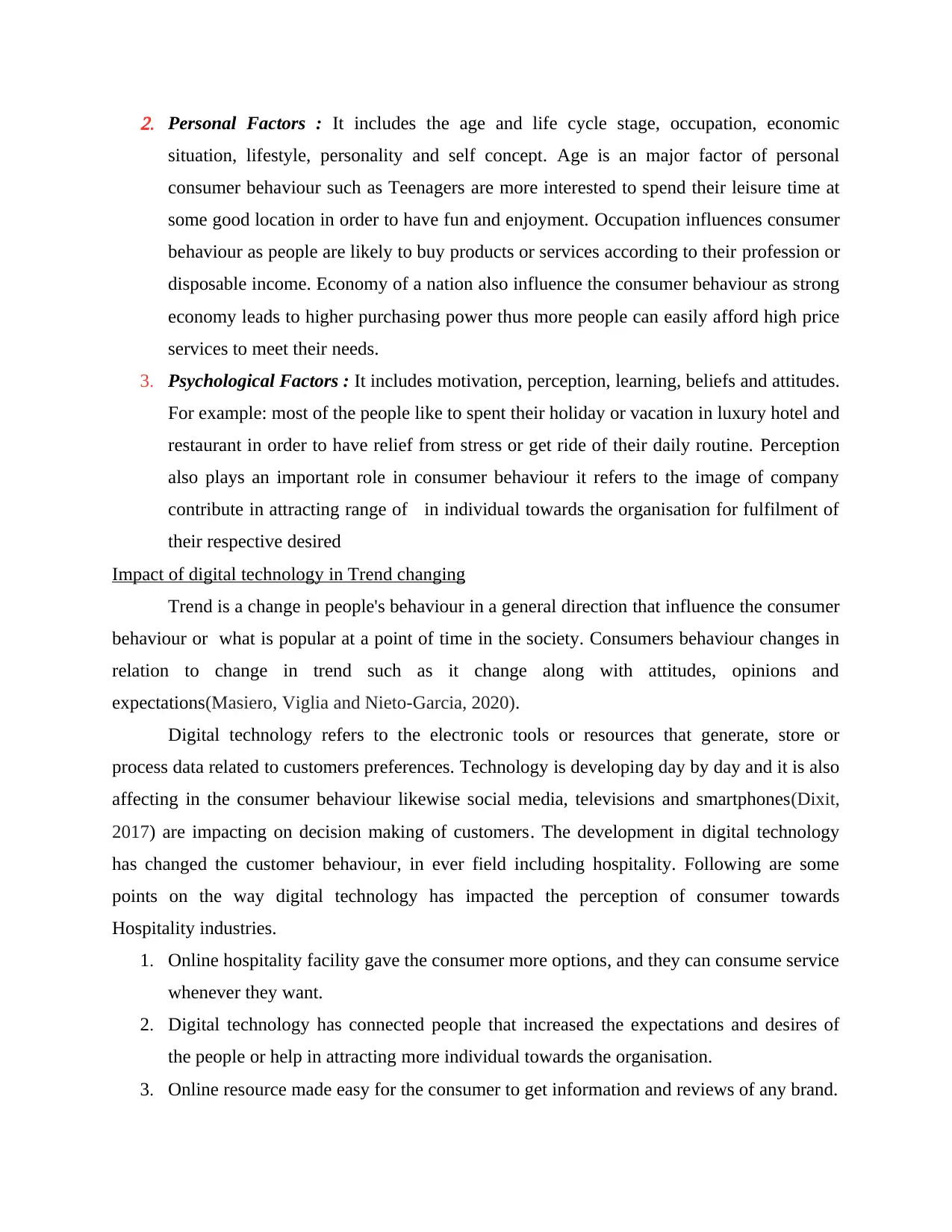
2. Personal Factors : It includes the age and life cycle stage, occupation, economic
situation, lifestyle, personality and self concept. Age is an major factor of personal
consumer behaviour such as Teenagers are more interested to spend their leisure time at
some good location in order to have fun and enjoyment. Occupation influences consumer
behaviour as people are likely to buy products or services according to their profession or
disposable income. Economy of a nation also influence the consumer behaviour as strong
economy leads to higher purchasing power thus more people can easily afford high price
services to meet their needs.
3. Psychological Factors : It includes motivation, perception, learning, beliefs and attitudes.
For example: most of the people like to spent their holiday or vacation in luxury hotel and
restaurant in order to have relief from stress or get ride of their daily routine. Perception
also plays an important role in consumer behaviour it refers to the image of company
contribute in attracting range of in individual towards the organisation for fulfilment of
their respective desired
Impact of digital technology in Trend changing
Trend is a change in people's behaviour in a general direction that influence the consumer
behaviour or what is popular at a point of time in the society. Consumers behaviour changes in
relation to change in trend such as it change along with attitudes, opinions and
expectations(Masiero, Viglia and Nieto-Garcia, 2020).
Digital technology refers to the electronic tools or resources that generate, store or
process data related to customers preferences. Technology is developing day by day and it is also
affecting in the consumer behaviour likewise social media, televisions and smartphones(Dixit,
2017) are impacting on decision making of customers. The development in digital technology
has changed the customer behaviour, in ever field including hospitality. Following are some
points on the way digital technology has impacted the perception of consumer towards
Hospitality industries.
1. Online hospitality facility gave the consumer more options, and they can consume service
whenever they want.
2. Digital technology has connected people that increased the expectations and desires of
the people or help in attracting more individual towards the organisation.
3. Online resource made easy for the consumer to get information and reviews of any brand.
situation, lifestyle, personality and self concept. Age is an major factor of personal
consumer behaviour such as Teenagers are more interested to spend their leisure time at
some good location in order to have fun and enjoyment. Occupation influences consumer
behaviour as people are likely to buy products or services according to their profession or
disposable income. Economy of a nation also influence the consumer behaviour as strong
economy leads to higher purchasing power thus more people can easily afford high price
services to meet their needs.
3. Psychological Factors : It includes motivation, perception, learning, beliefs and attitudes.
For example: most of the people like to spent their holiday or vacation in luxury hotel and
restaurant in order to have relief from stress or get ride of their daily routine. Perception
also plays an important role in consumer behaviour it refers to the image of company
contribute in attracting range of in individual towards the organisation for fulfilment of
their respective desired
Impact of digital technology in Trend changing
Trend is a change in people's behaviour in a general direction that influence the consumer
behaviour or what is popular at a point of time in the society. Consumers behaviour changes in
relation to change in trend such as it change along with attitudes, opinions and
expectations(Masiero, Viglia and Nieto-Garcia, 2020).
Digital technology refers to the electronic tools or resources that generate, store or
process data related to customers preferences. Technology is developing day by day and it is also
affecting in the consumer behaviour likewise social media, televisions and smartphones(Dixit,
2017) are impacting on decision making of customers. The development in digital technology
has changed the customer behaviour, in ever field including hospitality. Following are some
points on the way digital technology has impacted the perception of consumer towards
Hospitality industries.
1. Online hospitality facility gave the consumer more options, and they can consume service
whenever they want.
2. Digital technology has connected people that increased the expectations and desires of
the people or help in attracting more individual towards the organisation.
3. Online resource made easy for the consumer to get information and reviews of any brand.
Paraphrase This Document
Need a fresh take? Get an instant paraphrase of this document with our AI Paraphraser
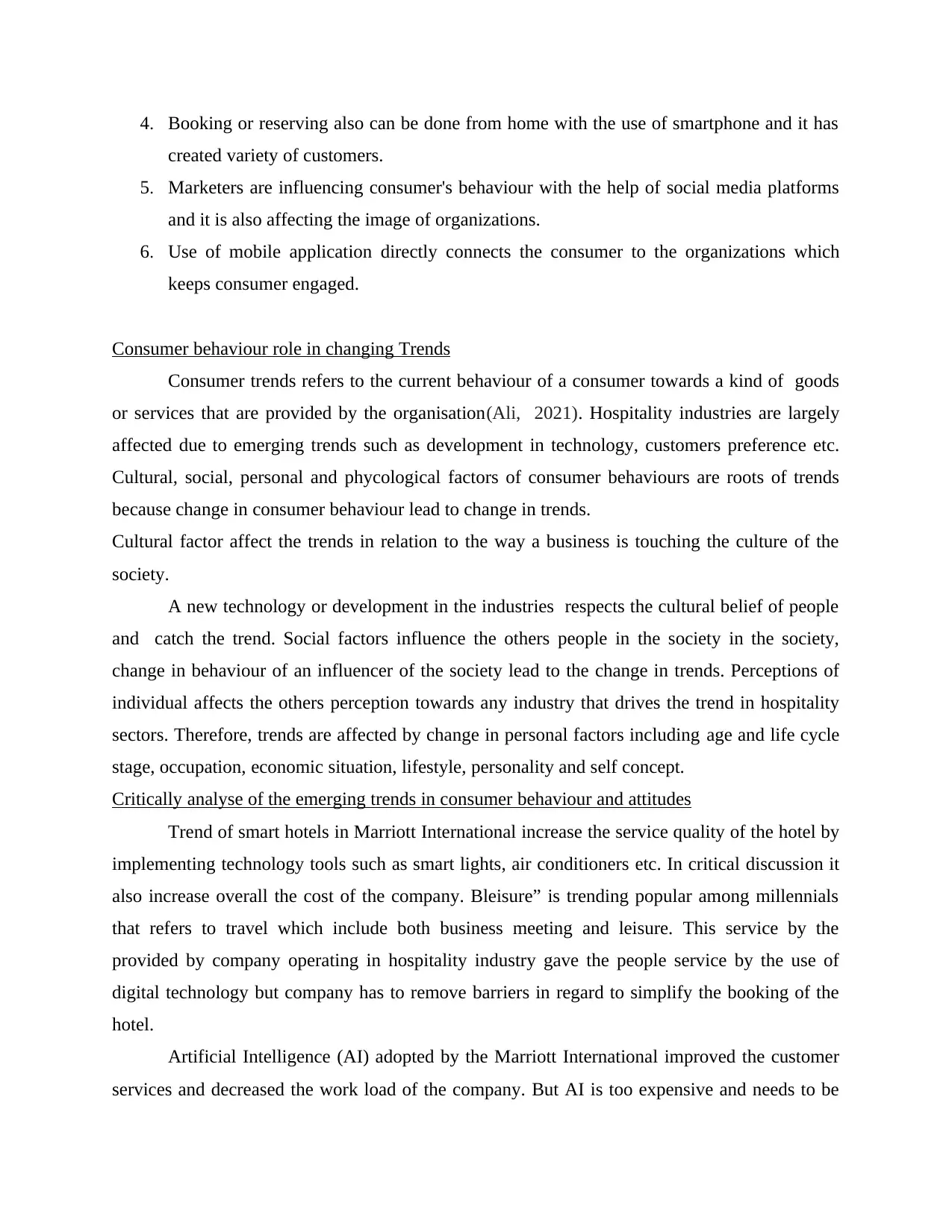
4. Booking or reserving also can be done from home with the use of smartphone and it has
created variety of customers.
5. Marketers are influencing consumer's behaviour with the help of social media platforms
and it is also affecting the image of organizations.
6. Use of mobile application directly connects the consumer to the organizations which
keeps consumer engaged.
Consumer behaviour role in changing Trends
Consumer trends refers to the current behaviour of a consumer towards a kind of goods
or services that are provided by the organisation(Ali, 2021). Hospitality industries are largely
affected due to emerging trends such as development in technology, customers preference etc.
Cultural, social, personal and phycological factors of consumer behaviours are roots of trends
because change in consumer behaviour lead to change in trends.
Cultural factor affect the trends in relation to the way a business is touching the culture of the
society.
A new technology or development in the industries respects the cultural belief of people
and catch the trend. Social factors influence the others people in the society in the society,
change in behaviour of an influencer of the society lead to the change in trends. Perceptions of
individual affects the others perception towards any industry that drives the trend in hospitality
sectors. Therefore, trends are affected by change in personal factors including age and life cycle
stage, occupation, economic situation, lifestyle, personality and self concept.
Critically analyse of the emerging trends in consumer behaviour and attitudes
Trend of smart hotels in Marriott International increase the service quality of the hotel by
implementing technology tools such as smart lights, air conditioners etc. In critical discussion it
also increase overall the cost of the company. Bleisure” is trending popular among millennials
that refers to travel which include both business meeting and leisure. This service by the
provided by company operating in hospitality industry gave the people service by the use of
digital technology but company has to remove barriers in regard to simplify the booking of the
hotel.
Artificial Intelligence (AI) adopted by the Marriott International improved the customer
services and decreased the work load of the company. But AI is too expensive and needs to be
created variety of customers.
5. Marketers are influencing consumer's behaviour with the help of social media platforms
and it is also affecting the image of organizations.
6. Use of mobile application directly connects the consumer to the organizations which
keeps consumer engaged.
Consumer behaviour role in changing Trends
Consumer trends refers to the current behaviour of a consumer towards a kind of goods
or services that are provided by the organisation(Ali, 2021). Hospitality industries are largely
affected due to emerging trends such as development in technology, customers preference etc.
Cultural, social, personal and phycological factors of consumer behaviours are roots of trends
because change in consumer behaviour lead to change in trends.
Cultural factor affect the trends in relation to the way a business is touching the culture of the
society.
A new technology or development in the industries respects the cultural belief of people
and catch the trend. Social factors influence the others people in the society in the society,
change in behaviour of an influencer of the society lead to the change in trends. Perceptions of
individual affects the others perception towards any industry that drives the trend in hospitality
sectors. Therefore, trends are affected by change in personal factors including age and life cycle
stage, occupation, economic situation, lifestyle, personality and self concept.
Critically analyse of the emerging trends in consumer behaviour and attitudes
Trend of smart hotels in Marriott International increase the service quality of the hotel by
implementing technology tools such as smart lights, air conditioners etc. In critical discussion it
also increase overall the cost of the company. Bleisure” is trending popular among millennials
that refers to travel which include both business meeting and leisure. This service by the
provided by company operating in hospitality industry gave the people service by the use of
digital technology but company has to remove barriers in regard to simplify the booking of the
hotel.
Artificial Intelligence (AI) adopted by the Marriott International improved the customer
services and decreased the work load of the company. But AI is too expensive and needs to be
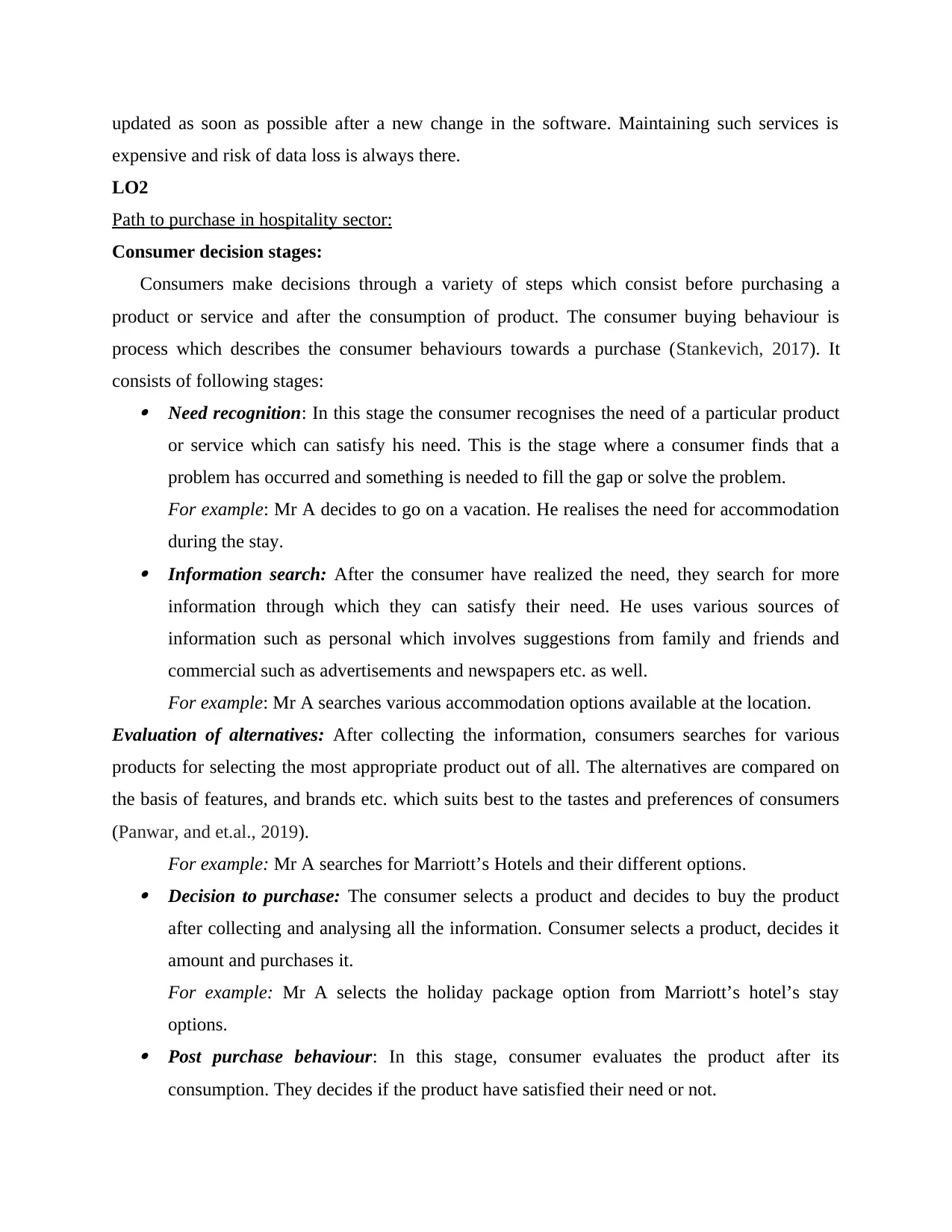
updated as soon as possible after a new change in the software. Maintaining such services is
expensive and risk of data loss is always there.
LO2
Path to purchase in hospitality sector:
Consumer decision stages:
Consumers make decisions through a variety of steps which consist before purchasing a
product or service and after the consumption of product. The consumer buying behaviour is
process which describes the consumer behaviours towards a purchase (Stankevich, 2017). It
consists of following stages: Need recognition: In this stage the consumer recognises the need of a particular product
or service which can satisfy his need. This is the stage where a consumer finds that a
problem has occurred and something is needed to fill the gap or solve the problem.
For example: Mr A decides to go on a vacation. He realises the need for accommodation
during the stay. Information search: After the consumer have realized the need, they search for more
information through which they can satisfy their need. He uses various sources of
information such as personal which involves suggestions from family and friends and
commercial such as advertisements and newspapers etc. as well.
For example: Mr A searches various accommodation options available at the location.
Evaluation of alternatives: After collecting the information, consumers searches for various
products for selecting the most appropriate product out of all. The alternatives are compared on
the basis of features, and brands etc. which suits best to the tastes and preferences of consumers
(Panwar, and et.al., 2019).
For example: Mr A searches for Marriott’s Hotels and their different options. Decision to purchase: The consumer selects a product and decides to buy the product
after collecting and analysing all the information. Consumer selects a product, decides it
amount and purchases it.
For example: Mr A selects the holiday package option from Marriott’s hotel’s stay
options. Post purchase behaviour: In this stage, consumer evaluates the product after its
consumption. They decides if the product have satisfied their need or not.
expensive and risk of data loss is always there.
LO2
Path to purchase in hospitality sector:
Consumer decision stages:
Consumers make decisions through a variety of steps which consist before purchasing a
product or service and after the consumption of product. The consumer buying behaviour is
process which describes the consumer behaviours towards a purchase (Stankevich, 2017). It
consists of following stages: Need recognition: In this stage the consumer recognises the need of a particular product
or service which can satisfy his need. This is the stage where a consumer finds that a
problem has occurred and something is needed to fill the gap or solve the problem.
For example: Mr A decides to go on a vacation. He realises the need for accommodation
during the stay. Information search: After the consumer have realized the need, they search for more
information through which they can satisfy their need. He uses various sources of
information such as personal which involves suggestions from family and friends and
commercial such as advertisements and newspapers etc. as well.
For example: Mr A searches various accommodation options available at the location.
Evaluation of alternatives: After collecting the information, consumers searches for various
products for selecting the most appropriate product out of all. The alternatives are compared on
the basis of features, and brands etc. which suits best to the tastes and preferences of consumers
(Panwar, and et.al., 2019).
For example: Mr A searches for Marriott’s Hotels and their different options. Decision to purchase: The consumer selects a product and decides to buy the product
after collecting and analysing all the information. Consumer selects a product, decides it
amount and purchases it.
For example: Mr A selects the holiday package option from Marriott’s hotel’s stay
options. Post purchase behaviour: In this stage, consumer evaluates the product after its
consumption. They decides if the product have satisfied their need or not.
⊘ This is a preview!⊘
Do you want full access?
Subscribe today to unlock all pages.

Trusted by 1+ million students worldwide
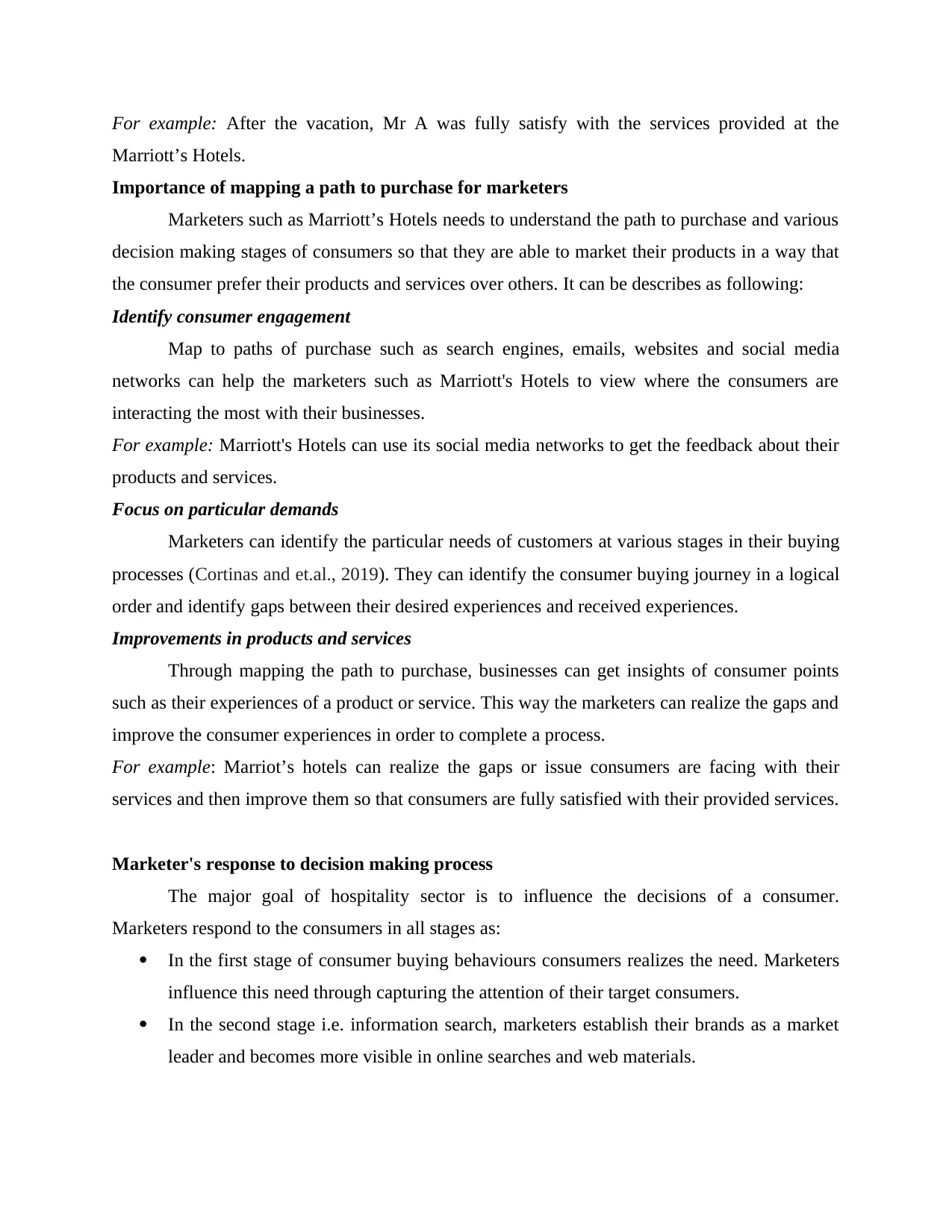
For example: After the vacation, Mr A was fully satisfy with the services provided at the
Marriott’s Hotels.
Importance of mapping a path to purchase for marketers
Marketers such as Marriott’s Hotels needs to understand the path to purchase and various
decision making stages of consumers so that they are able to market their products in a way that
the consumer prefer their products and services over others. It can be describes as following:
Identify consumer engagement
Map to paths of purchase such as search engines, emails, websites and social media
networks can help the marketers such as Marriott's Hotels to view where the consumers are
interacting the most with their businesses.
For example: Marriott's Hotels can use its social media networks to get the feedback about their
products and services.
Focus on particular demands
Marketers can identify the particular needs of customers at various stages in their buying
processes (Cortinas and et.al., 2019). They can identify the consumer buying journey in a logical
order and identify gaps between their desired experiences and received experiences.
Improvements in products and services
Through mapping the path to purchase, businesses can get insights of consumer points
such as their experiences of a product or service. This way the marketers can realize the gaps and
improve the consumer experiences in order to complete a process.
For example: Marriot’s hotels can realize the gaps or issue consumers are facing with their
services and then improve them so that consumers are fully satisfied with their provided services.
Marketer's response to decision making process
The major goal of hospitality sector is to influence the decisions of a consumer.
Marketers respond to the consumers in all stages as:
In the first stage of consumer buying behaviours consumers realizes the need. Marketers
influence this need through capturing the attention of their target consumers.
In the second stage i.e. information search, marketers establish their brands as a market
leader and becomes more visible in online searches and web materials.
Marriott’s Hotels.
Importance of mapping a path to purchase for marketers
Marketers such as Marriott’s Hotels needs to understand the path to purchase and various
decision making stages of consumers so that they are able to market their products in a way that
the consumer prefer their products and services over others. It can be describes as following:
Identify consumer engagement
Map to paths of purchase such as search engines, emails, websites and social media
networks can help the marketers such as Marriott's Hotels to view where the consumers are
interacting the most with their businesses.
For example: Marriott's Hotels can use its social media networks to get the feedback about their
products and services.
Focus on particular demands
Marketers can identify the particular needs of customers at various stages in their buying
processes (Cortinas and et.al., 2019). They can identify the consumer buying journey in a logical
order and identify gaps between their desired experiences and received experiences.
Improvements in products and services
Through mapping the path to purchase, businesses can get insights of consumer points
such as their experiences of a product or service. This way the marketers can realize the gaps and
improve the consumer experiences in order to complete a process.
For example: Marriot’s hotels can realize the gaps or issue consumers are facing with their
services and then improve them so that consumers are fully satisfied with their provided services.
Marketer's response to decision making process
The major goal of hospitality sector is to influence the decisions of a consumer.
Marketers respond to the consumers in all stages as:
In the first stage of consumer buying behaviours consumers realizes the need. Marketers
influence this need through capturing the attention of their target consumers.
In the second stage i.e. information search, marketers establish their brands as a market
leader and becomes more visible in online searches and web materials.
Paraphrase This Document
Need a fresh take? Get an instant paraphrase of this document with our AI Paraphraser
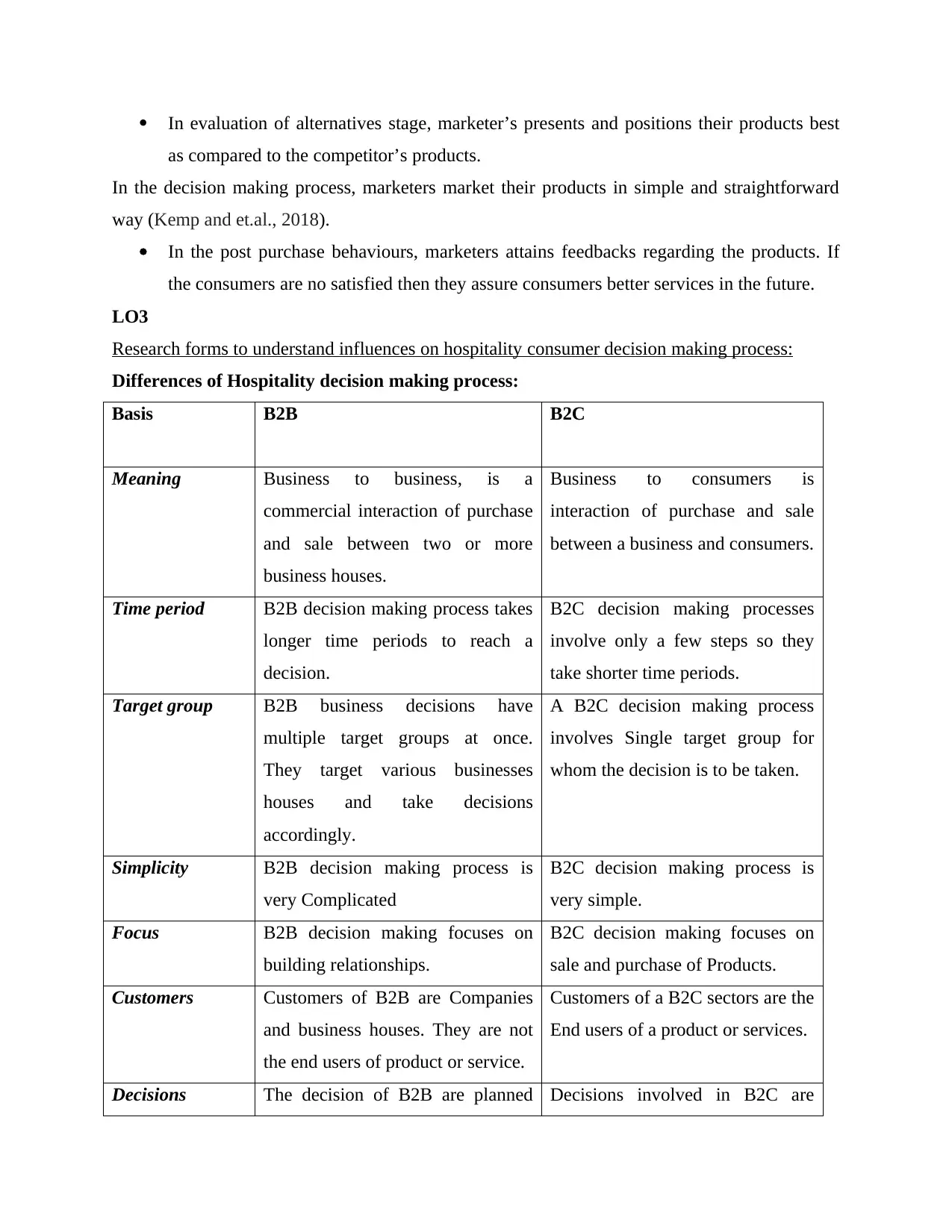
In evaluation of alternatives stage, marketer’s presents and positions their products best
as compared to the competitor’s products.
In the decision making process, marketers market their products in simple and straightforward
way (Kemp and et.al., 2018).
In the post purchase behaviours, marketers attains feedbacks regarding the products. If
the consumers are no satisfied then they assure consumers better services in the future.
LO3
Research forms to understand influences on hospitality consumer decision making process:
Differences of Hospitality decision making process:
Basis B2B B2C
Meaning Business to business, is a
commercial interaction of purchase
and sale between two or more
business houses.
Business to consumers is
interaction of purchase and sale
between a business and consumers.
Time period B2B decision making process takes
longer time periods to reach a
decision.
B2C decision making processes
involve only a few steps so they
take shorter time periods.
Target group B2B business decisions have
multiple target groups at once.
They target various businesses
houses and take decisions
accordingly.
A B2C decision making process
involves Single target group for
whom the decision is to be taken.
Simplicity B2B decision making process is
very Complicated
B2C decision making process is
very simple.
Focus B2B decision making focuses on
building relationships.
B2C decision making focuses on
sale and purchase of Products.
Customers Customers of B2B are Companies
and business houses. They are not
the end users of product or service.
Customers of a B2C sectors are the
End users of a product or services.
Decisions The decision of B2B are planned Decisions involved in B2C are
as compared to the competitor’s products.
In the decision making process, marketers market their products in simple and straightforward
way (Kemp and et.al., 2018).
In the post purchase behaviours, marketers attains feedbacks regarding the products. If
the consumers are no satisfied then they assure consumers better services in the future.
LO3
Research forms to understand influences on hospitality consumer decision making process:
Differences of Hospitality decision making process:
Basis B2B B2C
Meaning Business to business, is a
commercial interaction of purchase
and sale between two or more
business houses.
Business to consumers is
interaction of purchase and sale
between a business and consumers.
Time period B2B decision making process takes
longer time periods to reach a
decision.
B2C decision making processes
involve only a few steps so they
take shorter time periods.
Target group B2B business decisions have
multiple target groups at once.
They target various businesses
houses and take decisions
accordingly.
A B2C decision making process
involves Single target group for
whom the decision is to be taken.
Simplicity B2B decision making process is
very Complicated
B2C decision making process is
very simple.
Focus B2B decision making focuses on
building relationships.
B2C decision making focuses on
sale and purchase of Products.
Customers Customers of B2B are Companies
and business houses. They are not
the end users of product or service.
Customers of a B2C sectors are the
End users of a product or services.
Decisions The decision of B2B are planned Decisions involved in B2C are
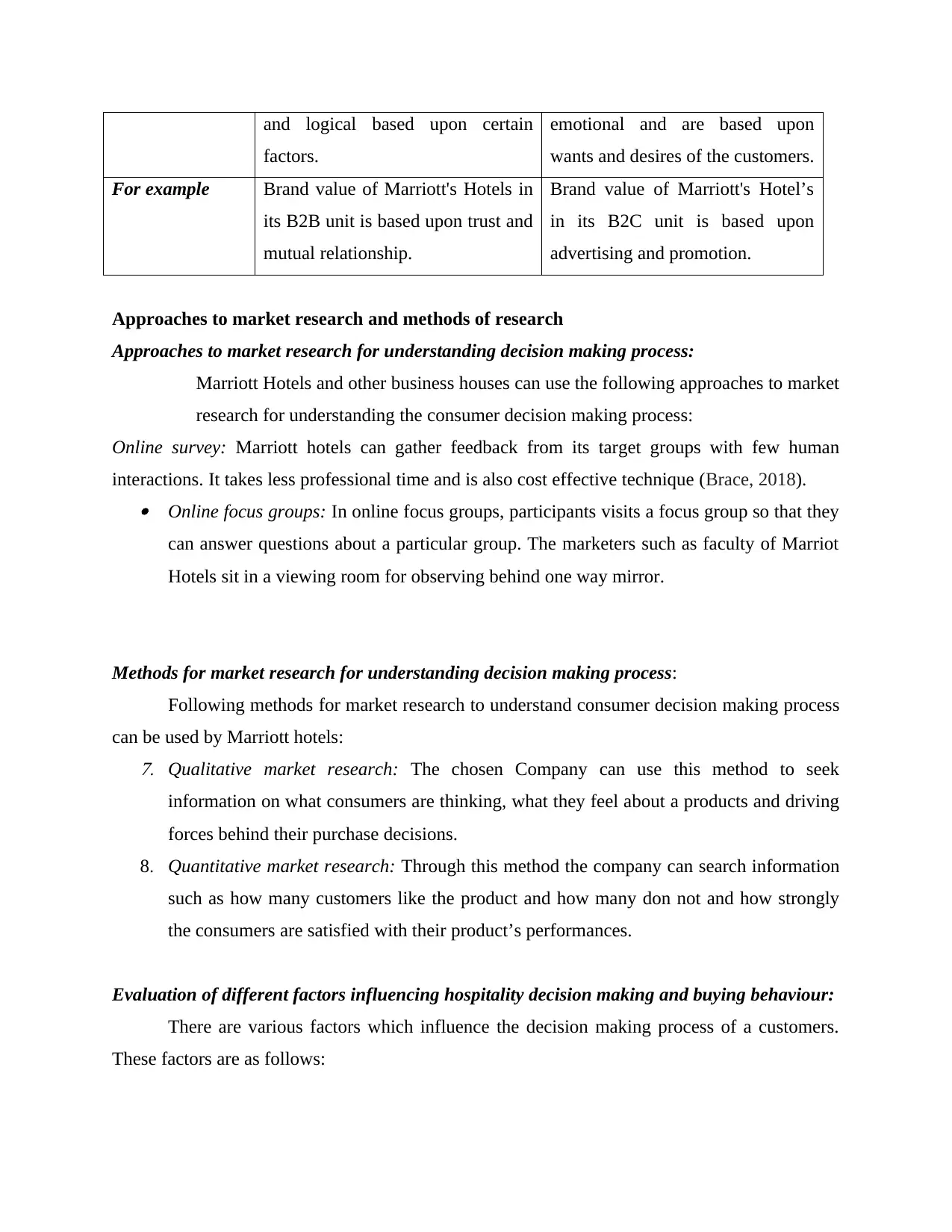
and logical based upon certain
factors.
emotional and are based upon
wants and desires of the customers.
For example Brand value of Marriott's Hotels in
its B2B unit is based upon trust and
mutual relationship.
Brand value of Marriott's Hotel’s
in its B2C unit is based upon
advertising and promotion.
Approaches to market research and methods of research
Approaches to market research for understanding decision making process:
Marriott Hotels and other business houses can use the following approaches to market
research for understanding the consumer decision making process:
Online survey: Marriott hotels can gather feedback from its target groups with few human
interactions. It takes less professional time and is also cost effective technique (Brace, 2018). Online focus groups: In online focus groups, participants visits a focus group so that they
can answer questions about a particular group. The marketers such as faculty of Marriot
Hotels sit in a viewing room for observing behind one way mirror.
Methods for market research for understanding decision making process:
Following methods for market research to understand consumer decision making process
can be used by Marriott hotels:7. Qualitative market research: The chosen Company can use this method to seek
information on what consumers are thinking, what they feel about a products and driving
forces behind their purchase decisions.
8. Quantitative market research: Through this method the company can search information
such as how many customers like the product and how many don not and how strongly
the consumers are satisfied with their product’s performances.
Evaluation of different factors influencing hospitality decision making and buying behaviour:
There are various factors which influence the decision making process of a customers.
These factors are as follows:
factors.
emotional and are based upon
wants and desires of the customers.
For example Brand value of Marriott's Hotels in
its B2B unit is based upon trust and
mutual relationship.
Brand value of Marriott's Hotel’s
in its B2C unit is based upon
advertising and promotion.
Approaches to market research and methods of research
Approaches to market research for understanding decision making process:
Marriott Hotels and other business houses can use the following approaches to market
research for understanding the consumer decision making process:
Online survey: Marriott hotels can gather feedback from its target groups with few human
interactions. It takes less professional time and is also cost effective technique (Brace, 2018). Online focus groups: In online focus groups, participants visits a focus group so that they
can answer questions about a particular group. The marketers such as faculty of Marriot
Hotels sit in a viewing room for observing behind one way mirror.
Methods for market research for understanding decision making process:
Following methods for market research to understand consumer decision making process
can be used by Marriott hotels:7. Qualitative market research: The chosen Company can use this method to seek
information on what consumers are thinking, what they feel about a products and driving
forces behind their purchase decisions.
8. Quantitative market research: Through this method the company can search information
such as how many customers like the product and how many don not and how strongly
the consumers are satisfied with their product’s performances.
Evaluation of different factors influencing hospitality decision making and buying behaviour:
There are various factors which influence the decision making process of a customers.
These factors are as follows:
⊘ This is a preview!⊘
Do you want full access?
Subscribe today to unlock all pages.

Trusted by 1+ million students worldwide
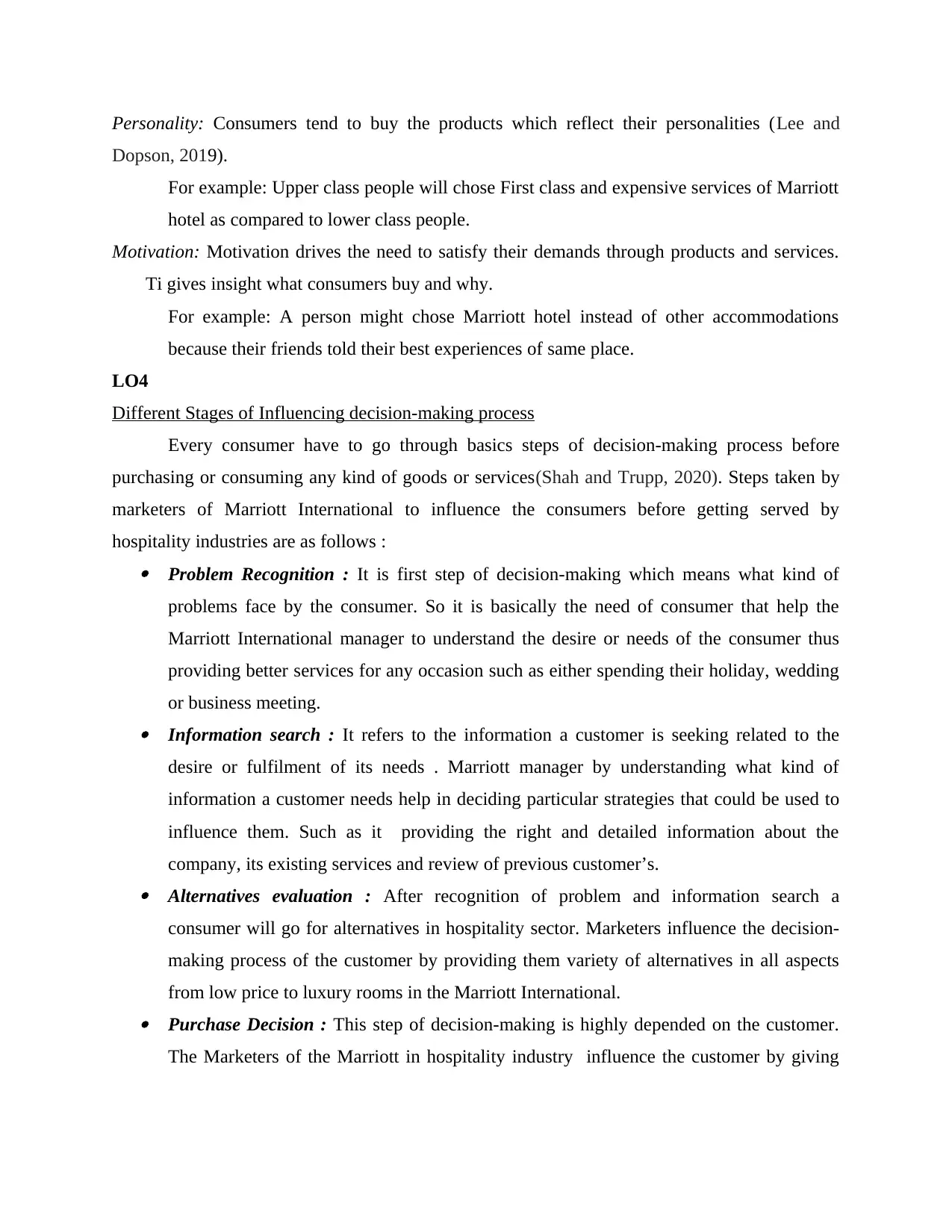
Personality: Consumers tend to buy the products which reflect their personalities (Lee and
Dopson, 2019).
For example: Upper class people will chose First class and expensive services of Marriott
hotel as compared to lower class people.
Motivation: Motivation drives the need to satisfy their demands through products and services.
Ti gives insight what consumers buy and why.
For example: A person might chose Marriott hotel instead of other accommodations
because their friends told their best experiences of same place.
LO4
Different Stages of Influencing decision-making process
Every consumer have to go through basics steps of decision-making process before
purchasing or consuming any kind of goods or services(Shah and Trupp, 2020). Steps taken by
marketers of Marriott International to influence the consumers before getting served by
hospitality industries are as follows : Problem Recognition : It is first step of decision-making which means what kind of
problems face by the consumer. So it is basically the need of consumer that help the
Marriott International manager to understand the desire or needs of the consumer thus
providing better services for any occasion such as either spending their holiday, wedding
or business meeting. Information search : It refers to the information a customer is seeking related to the
desire or fulfilment of its needs . Marriott manager by understanding what kind of
information a customer needs help in deciding particular strategies that could be used to
influence them. Such as it providing the right and detailed information about the
company, its existing services and review of previous customer’s. Alternatives evaluation : After recognition of problem and information search a
consumer will go for alternatives in hospitality sector. Marketers influence the decision-
making process of the customer by providing them variety of alternatives in all aspects
from low price to luxury rooms in the Marriott International. Purchase Decision : This step of decision-making is highly depended on the customer.
The Marketers of the Marriott in hospitality industry influence the customer by giving
Dopson, 2019).
For example: Upper class people will chose First class and expensive services of Marriott
hotel as compared to lower class people.
Motivation: Motivation drives the need to satisfy their demands through products and services.
Ti gives insight what consumers buy and why.
For example: A person might chose Marriott hotel instead of other accommodations
because their friends told their best experiences of same place.
LO4
Different Stages of Influencing decision-making process
Every consumer have to go through basics steps of decision-making process before
purchasing or consuming any kind of goods or services(Shah and Trupp, 2020). Steps taken by
marketers of Marriott International to influence the consumers before getting served by
hospitality industries are as follows : Problem Recognition : It is first step of decision-making which means what kind of
problems face by the consumer. So it is basically the need of consumer that help the
Marriott International manager to understand the desire or needs of the consumer thus
providing better services for any occasion such as either spending their holiday, wedding
or business meeting. Information search : It refers to the information a customer is seeking related to the
desire or fulfilment of its needs . Marriott manager by understanding what kind of
information a customer needs help in deciding particular strategies that could be used to
influence them. Such as it providing the right and detailed information about the
company, its existing services and review of previous customer’s. Alternatives evaluation : After recognition of problem and information search a
consumer will go for alternatives in hospitality sector. Marketers influence the decision-
making process of the customer by providing them variety of alternatives in all aspects
from low price to luxury rooms in the Marriott International. Purchase Decision : This step of decision-making is highly depended on the customer.
The Marketers of the Marriott in hospitality industry influence the customer by giving
Paraphrase This Document
Need a fresh take? Get an instant paraphrase of this document with our AI Paraphraser
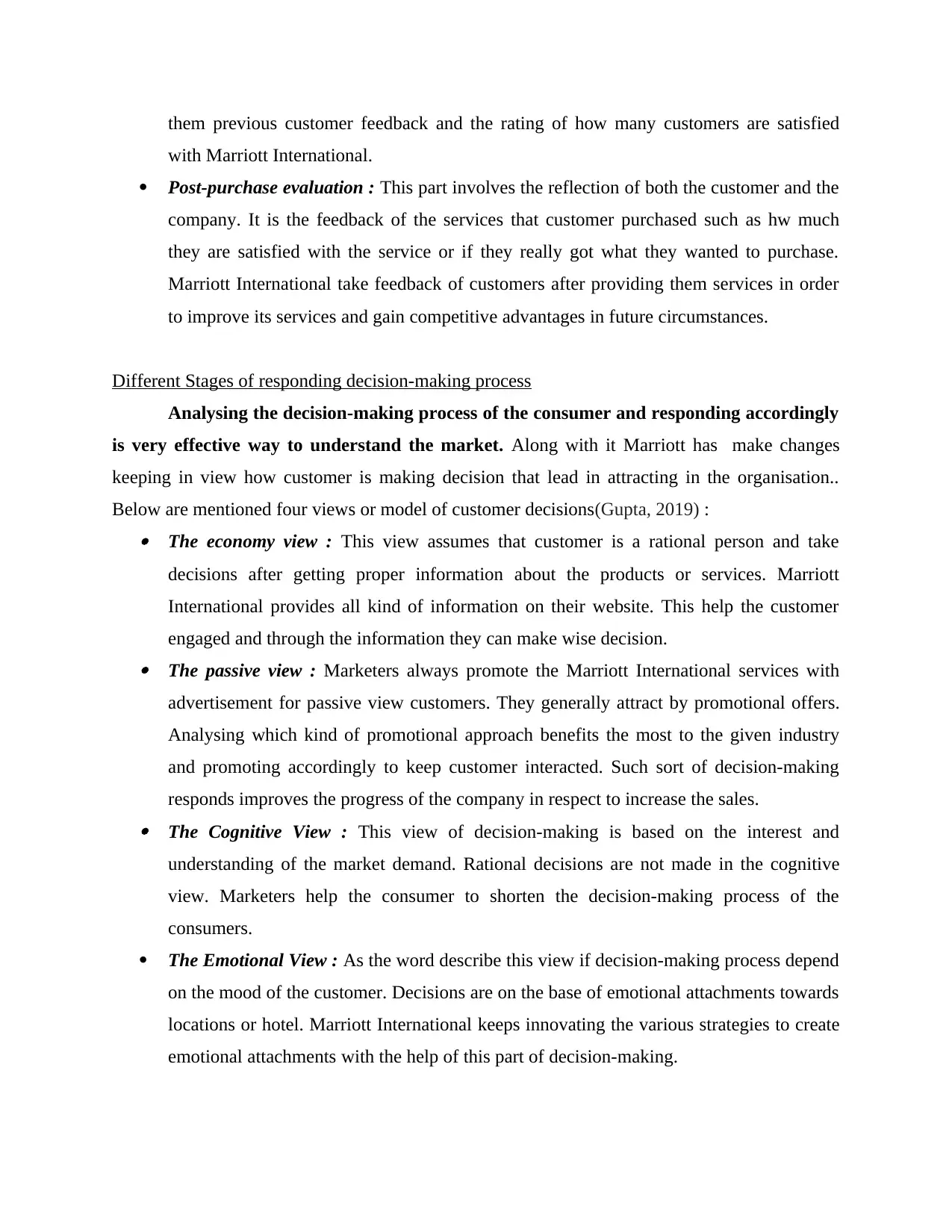
them previous customer feedback and the rating of how many customers are satisfied
with Marriott International.
Post-purchase evaluation : This part involves the reflection of both the customer and the
company. It is the feedback of the services that customer purchased such as hw much
they are satisfied with the service or if they really got what they wanted to purchase.
Marriott International take feedback of customers after providing them services in order
to improve its services and gain competitive advantages in future circumstances.
Different Stages of responding decision-making process
Analysing the decision-making process of the consumer and responding accordingly
is very effective way to understand the market. Along with it Marriott has make changes
keeping in view how customer is making decision that lead in attracting in the organisation..
Below are mentioned four views or model of customer decisions(Gupta, 2019) : The economy view : This view assumes that customer is a rational person and take
decisions after getting proper information about the products or services. Marriott
International provides all kind of information on their website. This help the customer
engaged and through the information they can make wise decision. The passive view : Marketers always promote the Marriott International services with
advertisement for passive view customers. They generally attract by promotional offers.
Analysing which kind of promotional approach benefits the most to the given industry
and promoting accordingly to keep customer interacted. Such sort of decision-making
responds improves the progress of the company in respect to increase the sales. The Cognitive View : This view of decision-making is based on the interest and
understanding of the market demand. Rational decisions are not made in the cognitive
view. Marketers help the consumer to shorten the decision-making process of the
consumers.
The Emotional View : As the word describe this view if decision-making process depend
on the mood of the customer. Decisions are on the base of emotional attachments towards
locations or hotel. Marriott International keeps innovating the various strategies to create
emotional attachments with the help of this part of decision-making.
with Marriott International.
Post-purchase evaluation : This part involves the reflection of both the customer and the
company. It is the feedback of the services that customer purchased such as hw much
they are satisfied with the service or if they really got what they wanted to purchase.
Marriott International take feedback of customers after providing them services in order
to improve its services and gain competitive advantages in future circumstances.
Different Stages of responding decision-making process
Analysing the decision-making process of the consumer and responding accordingly
is very effective way to understand the market. Along with it Marriott has make changes
keeping in view how customer is making decision that lead in attracting in the organisation..
Below are mentioned four views or model of customer decisions(Gupta, 2019) : The economy view : This view assumes that customer is a rational person and take
decisions after getting proper information about the products or services. Marriott
International provides all kind of information on their website. This help the customer
engaged and through the information they can make wise decision. The passive view : Marketers always promote the Marriott International services with
advertisement for passive view customers. They generally attract by promotional offers.
Analysing which kind of promotional approach benefits the most to the given industry
and promoting accordingly to keep customer interacted. Such sort of decision-making
responds improves the progress of the company in respect to increase the sales. The Cognitive View : This view of decision-making is based on the interest and
understanding of the market demand. Rational decisions are not made in the cognitive
view. Marketers help the consumer to shorten the decision-making process of the
consumers.
The Emotional View : As the word describe this view if decision-making process depend
on the mood of the customer. Decisions are on the base of emotional attachments towards
locations or hotel. Marriott International keeps innovating the various strategies to create
emotional attachments with the help of this part of decision-making.
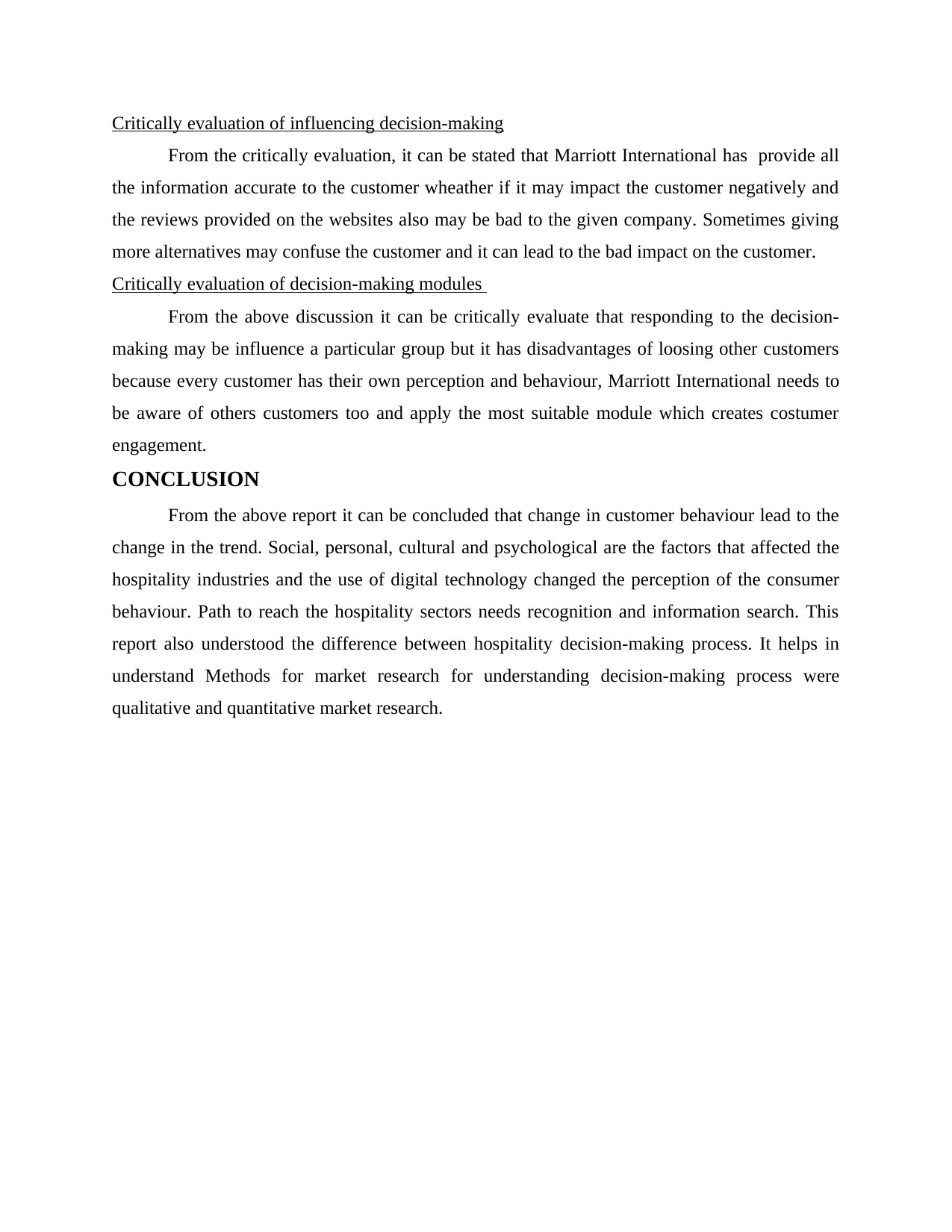
Critically evaluation of influencing decision-making
From the critically evaluation, it can be stated that Marriott International has provide all
the information accurate to the customer wheather if it may impact the customer negatively and
the reviews provided on the websites also may be bad to the given company. Sometimes giving
more alternatives may confuse the customer and it can lead to the bad impact on the customer.
Critically evaluation of decision-making modules
From the above discussion it can be critically evaluate that responding to the decision-
making may be influence a particular group but it has disadvantages of loosing other customers
because every customer has their own perception and behaviour, Marriott International needs to
be aware of others customers too and apply the most suitable module which creates costumer
engagement.
CONCLUSION
From the above report it can be concluded that change in customer behaviour lead to the
change in the trend. Social, personal, cultural and psychological are the factors that affected the
hospitality industries and the use of digital technology changed the perception of the consumer
behaviour. Path to reach the hospitality sectors needs recognition and information search. This
report also understood the difference between hospitality decision-making process. It helps in
understand Methods for market research for understanding decision-making process were
qualitative and quantitative market research.
From the critically evaluation, it can be stated that Marriott International has provide all
the information accurate to the customer wheather if it may impact the customer negatively and
the reviews provided on the websites also may be bad to the given company. Sometimes giving
more alternatives may confuse the customer and it can lead to the bad impact on the customer.
Critically evaluation of decision-making modules
From the above discussion it can be critically evaluate that responding to the decision-
making may be influence a particular group but it has disadvantages of loosing other customers
because every customer has their own perception and behaviour, Marriott International needs to
be aware of others customers too and apply the most suitable module which creates costumer
engagement.
CONCLUSION
From the above report it can be concluded that change in customer behaviour lead to the
change in the trend. Social, personal, cultural and psychological are the factors that affected the
hospitality industries and the use of digital technology changed the perception of the consumer
behaviour. Path to reach the hospitality sectors needs recognition and information search. This
report also understood the difference between hospitality decision-making process. It helps in
understand Methods for market research for understanding decision-making process were
qualitative and quantitative market research.
⊘ This is a preview!⊘
Do you want full access?
Subscribe today to unlock all pages.

Trusted by 1+ million students worldwide
1 out of 14
Related Documents
Your All-in-One AI-Powered Toolkit for Academic Success.
+13062052269
info@desklib.com
Available 24*7 on WhatsApp / Email
![[object Object]](/_next/static/media/star-bottom.7253800d.svg)
Unlock your academic potential
Copyright © 2020–2026 A2Z Services. All Rights Reserved. Developed and managed by ZUCOL.


